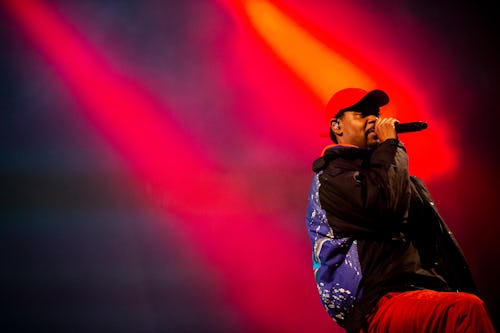
This story has a recount of sexual assault.
Danny Brown said that he was sexually assaulted by the South African rapper Ninja. Speaking to comedian Tom Segura on a recent episode of 2 Bears 1 Cave, the rapper detailed an incident in which Ninja, one half of the rap duo Die Antwoord, became aggressive with him at an afterparty in Paris.
“The n***a was sitting on my lap trying to make out with me, and it freaked me out,” Brown said. “[I was] in Paris, in a nightclub. I played this show and then my DJ had an afterparty.” He said that Ninja tried to initiate sex by proposing a threesome with Yolandi Visser, the other half of Die Antwoord with whom Ninja shares a child. “... He always throw Yolandi on you. I think that’s how he’s been fucking n****s,” Brown said.
Brown admitted he was a “single, experimenting man at the time,” but said that Ninja was “too aggressive.” “He sat on my lap and started trying to kiss me and shit, doing weird shit. I’m like, ‘Man, you tripping!’ Then everybody looking at me like, ‘Somebody fuck!’” He said that he began to drink alcohol at the party to cope with the stress of the situation. “Yeah, Ninja tried to fuck me,” Brown said with a nervous laugh. “I was scared.”
He then acknowledged that Die Antwoord has been getting “canceled a lot lately.” The duo have used blackface in their music videos and were caught on-camera using homophobic language against the musician Andy Butler (who is gay). Ninja has also been previously accused of sexual assault by at least two other musicians.
“Fuck them, though! Fuck them. I could’ve canceled cuz,” Brown said. “MeToo. MeToo. I was sexually assaulted by Ninja. I stand by that. He know that. He know I ain’t lying!”
Brown continued, saying that Ninja had sent Brown a DM, saying he would come to Brown’s show in Paris. At the show, Ninja crowd-surfed to him on-stage. At the afterparty, “He was like, ‘What hotel you staying at?’ I’m like, ‘Man, I don’t…’ ‘Don’t worry, I’ll find you.’ He said it again in my face. He said it in the DMs and then he said it again in my face. That’s what started making me pound drinks because I’m like, ‘I might have to stab this n***a tonight.’ Because if this n***a knock on my hotel room door, bro, I’m the stabbing the shit — it’s gonna be a big deal. It’s gonna be a thing.
“That would’ve been a fight, but I’m in Paris. Who want to be in a Parisian jail?” he added. “N***a, do you know what jail is like for me in Paris? It’s gonna be crazy. So I’m shellshocked, like, ‘This n***a’s really doing this?!’ … [But] I didn’t want to push the n***a to, like, throw the n***a up off me.”
Brown’s disturbing allegations are also a notable admission coming from a rapper — his openness about the situation, even his framing of it explicitly as assault (and aligning his experience with MeToo), is particularly remarkable in how it bucks against hip-hop’s typically narrow expectations around masculinity and projected machismo. Detailing this experience publicly is practically unthinkable for any major rapper. (Two telling moments come when Brown explicitly says “MeToo” and that Ninja sexually assaulted him: Segura laughs, while Brown decidedly does not, and then Brown begins a potentially revealing sentence that he immediately abandons: “Mad n***s could…”)
His story is also enhanced by another controversy from nearly a decade ago, when a fan began performing oral sex on Brown without his consent while he was performing on stage in Minneapolis. Brown did not speak on it, and the incident (which was captured on camera) became largely laughed about, among people of all stripes from Kendrick Lamar to average rap fans, as an outrageous snapshot of a rockstar lifestyle.
The rapper Kitty Pryde, though, who was close friends with Brown and on tour at the time with him, was outspoken in her frustration and disgust with the public reaction. “‘The Thing’ was not a thing that Danny facilitated — it was an actual sexual assault, and somehow nobody gives a fuck about that but me,” she wrote online. “It's obvious that the reason nobody cares is because a girl did it to a boy.”
The reaction now, less than 10 years later, to such an incident would likely be at least somewhat more measured. But perhaps not as dramatically different as one would hope — Brown’s story here is still something that Segura, perhaps unsure of how to respond to such a damning admission, can only laugh at in the moment.







